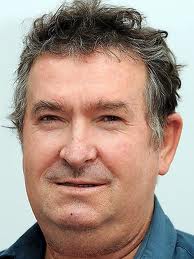I
THOUGHT everyone loved rhyming slang but I was wrong.
During
a bout of immersion in Aussie slang through my weekly column 7 Shouts, a reader wrote in to protest.
She
said Aussie rhyming slang and slang in general were provincial and uncouth.
I
took mild offence to the observation and was about to offer to write a short
but spirited defence of slang at the bottom of the reader’s published letter.
Thinking about it some more, I decided I had my weekly column and I should leave
the letter’s page to readers.
Rhyming slang originated in Cockney London but
Australians long ago imported it and contributed to the lexicon with relish.
In the 1943 Hollywood rom-com Mr Lucky, Cary Grant used it to effect
as something of plot mover. I am not sure whether Grant’s character says he
picked it up in Australia or whether his butler picked it up in Oz. But it
definitely came from Orstraytlya, as Grant pronounces our country.
Some of the expressions were “briny marlin”
(darlin’) “bottles and stoppers” (coppers, police), “tit for tat” (hat) and
“lady from Bristol” (pistol). A particularly amusing one to today’s ears, especially
as it came from Hollywood is “heap of coke” (bloke, man).
In the film, Gary Grant plays a professional
gambler and uses the slang in a coded interchange with leading lady Laraine Day
to thwart the corrupt bottles and stoppers. This is in keeping with the popular
academic theory rhyming slang was used by the criminal classes to exclude
authorities from an understanding of the true meaning of the conversation.
There may be some truth in this but I prefer the
simpler explanation rhyming slang was used because it was fun. Even the notion
of slang excluding outsiders has overtones of an in-joke. Some very perceptive
person, and I do not know who it was, coined the phrase ``poetry of the
streets’’ to describe slang.
I borrowed the term for my book of newspaper
columns and potted observations on Australian and world culture, 7 Shouts.
I will now put the case for the defence which I
eschewed on that letters’ page.
First, rhyming slang is somewhat
sophisticated. A working class purist
would never use the full expression as the Grant character was forced to do to
make it explicable to the viewer. Briny is a darlin’; bottles are coppers and a
lady is a pistol. You can see the pattern which gets even better; titfa is a
hat.
So here we go with the seven – some rhyming
slang, some relatives – from 7 Shouts:
1.
Frog’n
is a road as in frog ‘n’ toad. Let’s hit the frog’n on our trip down Slang Street.
2.
Khyber is arse or ass, in America. A
ban on further spoon feeding precludes
my saying what the second word is. But I will note that you can receive a kick
up the Khyber or you can get the khyber (be fired from your job). When I say
rhyming slang is sophisticated, I believe it can trigger imagery and
associations. Frog’n reminds me of a dead toad on the road and I associate
losing your job with having the “arse out of your pants”, an expressive
metaphor.
Billies are kids and I will give a
clue because not everyone will be familiar with boiling water in a tin on an
open fire to make tea, or these days, coffee.
The billy, about the height of an electric jug, usually has a wire
handle and a lid. I see that as an effective metaphor for a child.
3.
Rubbity is a pub, itself a
contraction of public bar, the traditionally working-class section of a hotel.
Rubbity comes from the English nursery rhyme rub-a-dub-dub. At their best, pubs
can be places of child-like fun.
4.
Rissole is an RSL club, a
gathering place for returned soldiers and their family. While not strictly
following the template for rhyming slang, you can see the connection with a play
on words or rather the sound of an acronym. A rissole is a round meat patty. As
I have said one of the imaginative products of slang is the triggering of other
loosely related expressions. When I hear rissole for RSL, it conjures up
another expression, “see you round like a rissole’’. The picture of someone
peering into an RSL club, reminds me of, “if I don’t see you the through the
week, I’ll see you through the window.” It’s fun and it’s all good.
5.
Crab,
on another tangent, is a nickname for a sponger. Like rhyming slang, it omits
the second word, claw, in its reference to someone who puts the bite on you. I
always think of the fearsome yet delicious Australian mudcrab which has been
known to crack the bones in a finger of a careless handler.
6.
Chooks scratching around in the top paddock is an expression far removed from the basic
rhyming slang but you can see it is clearly just an advanced metaphor in the
poetry of the streets. Chooks are chickens perhaps changed to be an
approximation of one of the sounds poultry make. Chickens constantly scratch
the ground and the top paddock is the brain. In total, the picture is of
someone lacking clear thought.
What
is a clear thought is that slang is fun.
You
can buy 7 Shouts HERE.



